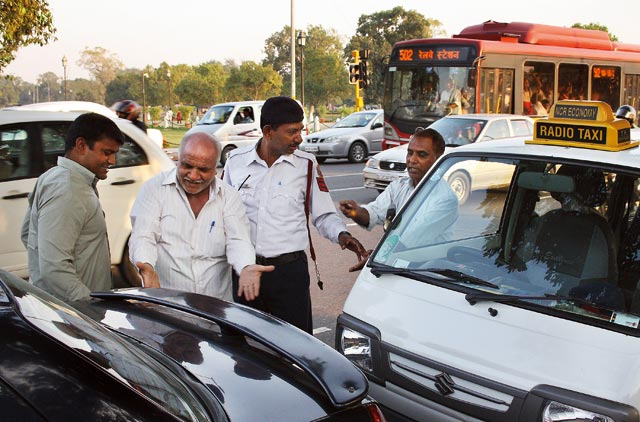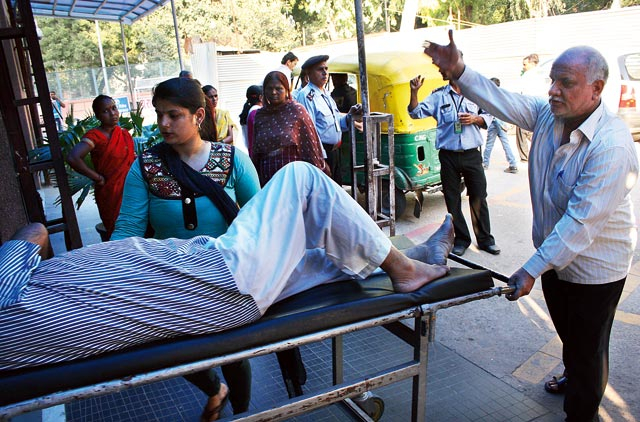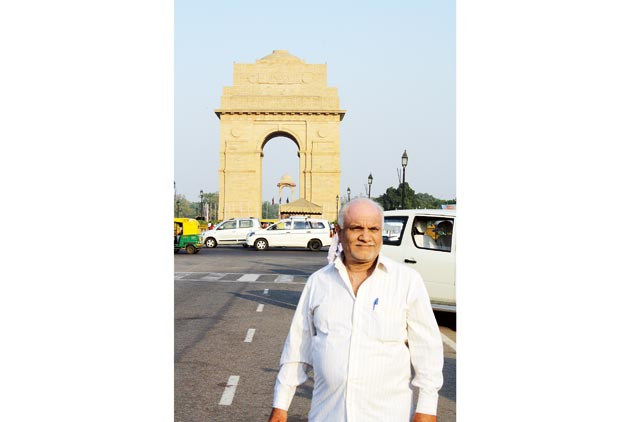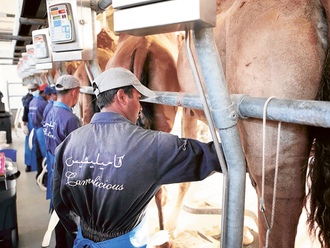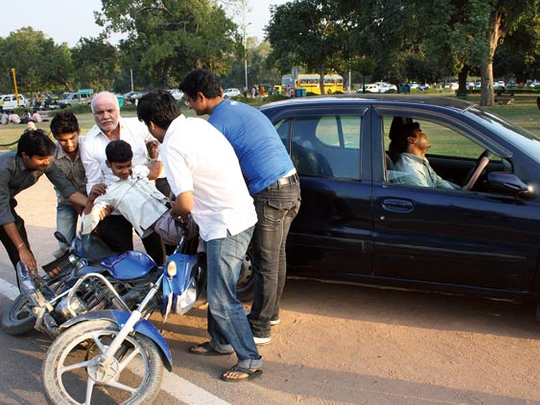
It was 10.30pm, and silent except for the distant rumble of trucks passing in the darkness, as Suraj Prakash Vaid drove home. The 60-year-old was tired from working at his car rental company, and eager to reach his house in East Delhi.
His five-year-old granddaughter Rukmini was staying with him, and he knew she would be awake. He couldn’t wait to play with her and read her a story. It was hot, so he rolled down his window, smiling as a cool breeze fanned him.
Then he gasped. Up ahead, illuminated in his headlights, was a woman lying by the side of the road, covered in blood.
Suraj immediately pulled over and rushed to help the woman. “For a moment I thought she was dead, but when I knelt near her I found that she was breathing,’’ he says. “My first instinct was to call an ambulance, but I feared that by the time one arrived it might be too late. I knew I had to help her myself.”
So Suraj gently picked up the woman and placed her on the back seats of his Ambassador car. He spotted her clutch bag a few feet away, picked it up then took the woman to the nearest hospital, ten kilometres away.
“Help me!” he shouted as soon as he arrived, and he followed as paramedics rushed the woman into the hospital. She had multiple fractures and was in a critical condition.
“They asked me for her details, and I remembered that I had the bag,’’ Suraj says.
He rummaged through it to find her ID – she was 30 and a teacher.
He also found the phone number of her husband, who he promptly called and summoned to the hospital. “The doctors meanwhile began treating her,’’ he says. “They told me that if I hadn’t brought her in at that time, she would have probably died, as she had lost a lost of blood.’’
It was early morning before Suraj got home, as he remained with the victim’s husband and extended family to console them. “I was really tired, but happy. There’s nothing greater than saving a person’s life,’’ he says.
The woman, who is making a full recovery, is not the first road accident victim Suraj has saved. On average he helps at least two people a week, and he estimates that he has saved at least 60 people’s lives.
It’s hardly surprising though. With one accident every minute, resulting in a death every three minutes last year, India has one of the worst road safety records in the world.
Figures from the Indian Road Transport Ministry show 497,000 road accidents were reported in India in 2011, and around 1.5 million people a year die, due to poor infrastructure and dangerous driving habits.
According to a report from Hindustan Times, among the states Maharashtra had the highest number of road accidents at 68,438, followed by Tamil Nadu (65,873), Madhya Pradesh (49,406), Karnataka (44,731) and Andhra Pradesh (44,165).
But it’s not just car crashes that cause problems in India. The roads in New Delhi pose a huge risk to pedestrians as well as drivers.
A report by the Indian police claimed more than 50 per cent of pedestrian deaths in New Delhi in 2012 were the result of hit-and-runs.
On October 15 this year, 313 pedestrians had died from hit-and-runs out of a total of 619 pedestrian deaths in the city so far.
According to experts, many of these victims could have survived if they had been rushed to a hospital, but witnesses or those who chanced upon the victims often choose not to interfere, afraid of getting into a legal wrangle.
“Many of the hit-and-run episodes are at night when there are fewer eyewitnesses,” says joint commissioner of the Delhi Traffic Police Satyendra Garg. And often in such instances, the victim simply bleeds to death due to lack of immediate medical attention.
Dr M C Misra, chief of All India Institute of Medical Sciences Trauma Centre, says it’s imperative for victims to be rushed straight to hospital if they’re to survive.
He added that the hospital has received several accident cases where there has been a considerable delay, which has ultimately proved fatal. “These patients have not arrived within the so-called golden hour, when they could have survived. At least 15 per cent more accident victims would survive if there was no delay.’’
It is this golden hour that Suraj knows could make the difference between life and death. That’s why he has does everything in his power to get road accident victims to the hospital as soon as he possibly can.
Lifesaver
The first time Suraj saved a life was in 1982.
He was 30 at the time, and witnessed an accident on Vikas Marg in East Delhi. A speeding car had knocked over two pedestrians while they were crossing the road.
As the victims lay on the road in a pool of blood, a huge crowd gathered, but no one stepped forward to offer help.
Suraj, who was a taxi driver back then and passing in his cab, stopped, picked up the severely injured duo and rushed them to the hospital. Both of them survived.
“It was just my instinct to save people in need,’’ he says. “I was shocked to see the attitude of the public that day, and I vowed not to become just a spectator in times of crisis.”
Over the past 30 years, he has saved the lives of at least 60 people. “Contrary to the popular perception that the police harasses those who bring the victims to hospitals, my experience with both the police and the hospitals has
been good,’’ he says.
Thanks to his relentless efforts, Suraj has been drafted in by the Delhi Police for their campaign, The Golden Hour, to spread awareness about road safety and traffic rules.
He now speaks to school children and members of the public at road safety awareness events. He also meets with hospitals and the Delhi Police to learn more about how he can help people in need, and what he should keep in mind when rescuing accident victims.
“Unlike in the past, a person taking a victim to hospital is no longer required to reveal his identity,” he says. “A lot of archaic rules have changed, and people in India shouldn’t fear unnecessary hassle in hospitals. There is a lack of awareness about these changes though.”
As he was on the road all day, and sometimes even through the night, while he was a taxi driver, he witnessed several accidents and hit-and-run cases. And in every instance, Suraj stopped to help the victims.
In return, he has received dozens of commendations and cash awards, not to mention the blessings of the victims’ families.
Though he doesn’t especially like mobile phones and actually finds them to be a bit of a nuisance, he had to buy one in 2004, because every time he had to call the police, ambulance or the family of an accident victim, he would have to borrow a phone, and there was no way for people to reach him.
Suraj doesn’t stop at just helping the accident victims. He also registers an FIR (First Information Report) with the police – a legal necessity for the police to begin investigations into the incident.
While Suraj travels in the city, he never forgets to carry a pen and paper with him, because it is important to note the registration number of a vehicle involved in a crash.
The social crusader also takes the time and effort to contact the victims’ families, and offers them moral and sometimes even financial help.
“Just last month while driving home late in the evening, I came across a biker lying on the ring road near Rajghat,” he says. “He had been involved in a crash with a Delhi Transport Corporation bus. Shockingly, no one took the initiative to take the injured man to hospital. Instead they all just stood around waiting for help to arrive.
“I took him in my taxi to the nearest hospital. I also spent my own money buying the required medicines, which were not available in the hospital, so he could be saved.
“I wanted to chide the onlookers for being mute spectators and not helping the man, but I knew that spending time on that might prove costly for the victim.’’ A week later, the biker contacted Suraj to thank him for saving his life.
Over the years, Suraj has learnt to look for signs that indicate the severity of an accident victim’s condition. “For instance, if the victim has broken his spine or suffered serious head injuries, it is best to call an ambulance or a qualified person who can offer expert help.
“I’ve also learnt how to lift and carry a victim, the basics of first aid to be given to them in crisis situations, and the few mandatory things that need to be done – such as informing the nearest hospital and police station – after rescuing an accident victim.
“So many times I’ve got home in the early hours, because so many accidents happen at night,” he says. “If the person is unconscious, I search for his belongings to find out about his family and inform them.
“In such circumstances, I try to stay back until the family reaches the hospital. I often find cash and valuables with victims, so I prepare a list of items before handing them over to the police or to the families,” he says.
Suraj’s family has learnt over the years not to worry too much if he is late coming home. “Medical and legal formalities take a long time, and my family are supportive of my work,” he says. “My son is an army officer and is serving the nation in his own way.”
One thing that touches a raw nerve in Suraj is the callous attitude of some people. “Even after witnessing serious accidents, some people refuse to come forward and lend a helping hand, mainly because they are scared to get into any legal issues,’’ he says.
“The police merely ask where the victim was found, which makes it easy to identify the patient. People are free to leave after they hand the victim over to the hospital.
“It is wrong to think that accidents can happen only to others and never to us. Some learn from experience, and begin helping others after they have lost a family member or a friend. But it is really sad that most people are still not conscious of how grave the problem of road accident deaths is in the country.”
Offering help
Apart from helping accident victims, Suraj has also helped save a child who went missing from her home.
“It was about eight years ago,” he says.
“I had parked my taxi in the Red Fort area and was awaiting passengers, when I saw a little girl who looked around seven years old about to be knocked down by a bus while she was attempting to cross the road. I managed to drag her to safety.
“I asked her where her parents were and she told me that she did not know. The kid had apparently stepped out of her home to a nearby park, but had got lost and ended up more than two kilometres from her house.
“I managed to reunite her with her distraught parents, who were about to report their missing child to the police. I cannot forget the cheerful faces of her parents when they found their child. Her father kept hugging me and his daughter again and again!”
Suraj’s helping nature isn’t just reserved for road accident victims. He once even helped people who were injured in a bomb blast near the police headquarters in Vikas Marg.
“It was about four years ago. There was a lot of smoke and dust and I was terrified,” he says. “Although I panicked for a moment, I controlled my instinct to flee and stayed there, as I knew people needed help.
“Moments later, when the smoke cleared, I realised that a bomb had gone off and there were half a dozen people who were injured and lying on the road writhing in pain.
“Without wasting time, I rushed the victims to hospital in my vehicle. Again, it was prompt medical attention that saved their lives.”
Suraj is proud of the numerous commendation certificates he has received from the Delhi Police. He had one from the Directorate General of Border Security Force, which he received after he saved the life of a constable on duty, after an accident near the New Delhi Railway Station.
Though ever ready and willing to do something that would create a positive impact on society, starting an organisation has never entered Suraj’s mind. “I am not in social service for monetary gain. Often people ask me if I would be interested in running an non-governmental organisation, but I don’t intend to. I just want to help as many people as I can.”
What inspires him is the love and affection of families he has helped. In some cases, he has saved the families from losing their sole bread-winner and in some, saved the life of an only child.
Most families express deep gratitude and remain in touch with him, and he considers them almost as members of his own family.
He says, “I have a huge extended family, both in India and abroad.”
In a final thought, Suraj shares his vision for the future, “India does not have an established emergency medical response system, which leads to hundreds of avoidable deaths every year. I want to bring about such a change in the system that people begin to value life.”
Danger on the roads
India has been found to have the most dangerous roads in the world. According to a World Health Organisation (Who) report, Decade of Action for Road Safety 2011-2020, India has the highest number of deaths due to road accidents in the world (1,05,725
annually).
In the report, Who claim that poor road infrastructure, failure to comply with speed limits, increasing cases of drink driving and poor driving habits are among the main factors. After India, China was the nation with the second most dangerous roads in the world, with 96,611 deaths, then the US (42,642) and Russia (35,972). In comparison, the number of road deaths reported in the UAE in 2009 was 1,056, the report said.


